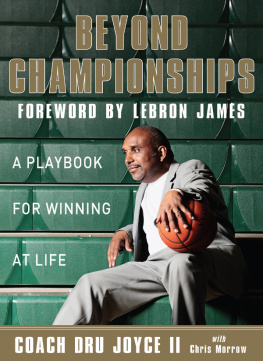

Copyright 2013 by Dr. Bill Thierfelder.
All rights reserved. With the exception of short excerpts used in articles and critical review, no part of this work may be reproduced, transmitted, or stored in any form whatsoever, printed or electronic, without the prior written permission of the publisher.
Cataloging-in-Publication data on file with the Library of Congress.
ISBN: 978-1-61890-403-4
Published in the United States by
Saint Benedict Press, LLC
PO Box 410487
Charlotte, NC 28241
www.saintbenedictpress.com
Printed and bound in the United States of America.
For Mary, my one, my wife,
and for all of my good children,
Mary, Joseph, Elizabeth, John,
James, Thomas, Luke, Ann,
Peter and Matthew, who help
me to see the perfection of the
present moment
C ONTENTS
The big picture .
The most common mental obstacles that get in the way of world-class performance .
Play is where world-class performance is born .
Playing for all the wrong reasons .
Belief determines emotion .
Awareness and adaptation; the process of change .
The power of words .
Only those that understand peak performance can repeat it often and on demand .
Peak performance happens when it is least expected .
Reproducing peak performance when it counts .
The stronger your purpose the better your performance .
Virtuous performances .
Pain without a purpose is intolerable to human beings .
The deeper meaning .
F OREWORD
I T WAS more than a love for the game of basketball that inspired me to devote my life and career to coaching, it was a passion for teaching and learning. I believe that to be a great teacher, you have to be an ever-willing learner; the process is reciprocal. And the main topic I have enjoyed learning and teaching the most throughout my career is leadership.
I have been fortunate to meet some great leaders from many walks of life and I love to engage in discussions with them on the topicto hear them explain their philosophies, to learn new techniques and see things from new perspectives and sometimes to find common leadership ground even when our backgrounds and fields are vastly different. I am committed to never stop learning and it is this commitment, in part, that drives me to keep doing what I do.
Dr. Bill Thierfelder is one of the leaders whose lessons and thoughts on the subject I value and appreciate. He has an unparalleled understanding of what it takes for an individual to turn his or her peak performance into their standard. As a leader and as a mentor to athletes, he knows exactly how to be the kind of leader who can help people develop that standard.
I love the way that Bill talks about pressure. For some, it is a frightening worda word that is accompanied by the fear of failure. In this book, Bill explains how to redefine pressure as an opportunity. Whether in sport, in business or in life, approaching pressure with excitement and confidence, as opposed to anxiety, is a critical step in becoming a top performer.
I also appreciate the way that Bill talks about expectations. I dont impose many rules with my teams. Instead, together we develop a set of standards unique to that particular group at that particular time. The standards we develop are importantthey define who we are and who we hope to become during the course of a season. But more important than the words and values we choose as ours is the fact that they are ours . The most important standard that an individual or team sets is the one that comes from the inside, not those that are imposed from the outside. We ought to be the ones to define who we are and, more than that, who we can and will become.
Bills book is ultimately about setting ones own standards and making certain that the standards you set are worthy, that they challenge you to achieve a level where peak performance is not something sought and rarely found but, rather, that your best self is your most common self.
In this book, my friend Bill Thierfelder, a great leader and motivator, puts the words and descriptions to what we leaders try to do every dayto challenge ourselves and our teams to be at our best, all the time.
Mike Krzyzewski, 2013
I NTRODUCTION
T HE sold-out crowd at Miamis Orange Bowl had started to celebrate. With six seconds remaining in the game and with Boston College down 4541, the game was over. The reigning NCAA Division I National Champions, the University of Miami Hurricanes, had weathered an incredible shoot-out with the Boston College Eagles. All that remained was for BC to run their last play from the Miami forty-seven yard-line and the oranges would start flying. The only problem was that no one had told BC quarterback, Doug Flutie.
With twenty-eight seconds remaining in the game Flutie began the drive from his own twenty yard-line. His first thought was, Given the time, I probably have four pass plays. World-class performers focus on what they can and will do. As he entered the huddle his confidence and resolve filled the team around him. Within two plays they were on the Miami forty-seven yard-line. The third pass fell incomplete, but to Flutie it was as if it had never happened. World-class performers remain focused in the present moment. Only six seconds remained in a game where both teams had combined for more than twelve-hundred yards of total offense. As Flutie came to the line, his eyes revealed a mind in control. He loved the game; he loved playing. And it showed. He was in the backyard with his buddies about to run everyones favorite play: the last second Hail Mary.
The ball was snapped and Flutie dropped back to pass. Before he could get set, he saw All-American defensive linemen Jerome Brown lunging toward him. Flutie had an uncanny knack for slipping out of a defensive players grasp at the last millisecond. Suddenly he was rolling out to his right, back to the BC thirty-five, with the defense closing in on him fast. In the melee Flutie never lost composure or focus. With determination and purpose he stepped toward the thirty-seven yard-line and threw a Hail Mary pass into a 30 mph headwind. The Miami defenders anticipated it, but that was the problem. They thought about what should happen rather than seeing what was happening. As they stood on the five yard line waiting to break-up the fifty yard pass that would never come they failed to recognize that the diminutive 510 173 lb. quarterback had actually thrown a sixty-three yard pass. By the time they realized it the ball had sailed over their heads and straining finger tips into the waiting arms of Gerard Phelan who caught the miraculous pass with no time left on the clock. Touchdown!
The backyard joy of old erupted. The BC players exploded into celebration, jumping, hugging, yelling, whooping, and frolicking around the field of play. No amount of money, power, or fame could add to that moment. The sheer joy of playing their best was all that counted. Those other things may come later but they would be, at best, faint reminders of that mystical moment of play: where play and wisdom find common ground in the contemplation of the highest things; where they exist for their own sake and not some mean and artificial end.
This is where the very best of world-class performance can cross over into a special realm known as peak performance: playing for its own sake with every skill, talent, and ability brought to bear in the present moment. The Greeks had a word for it, arte , meaning excellence or virtue. Aristotle said, Excellence is an art won by training and habituation. We do not act rightly because we have virtue or excellence, but we rather have those because we have acted rightly. We are what we repeatedly do. Excellence, then, is not an act but a habit.
Next page







![Whitaker Nathan - The mentor leader: [secrets to building people and teams that win consistently]](/uploads/posts/book/228009/thumbs/whitaker-nathan-the-mentor-leader-secrets-to.jpg)

